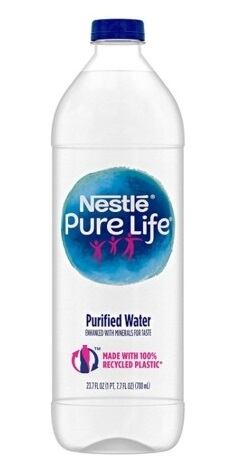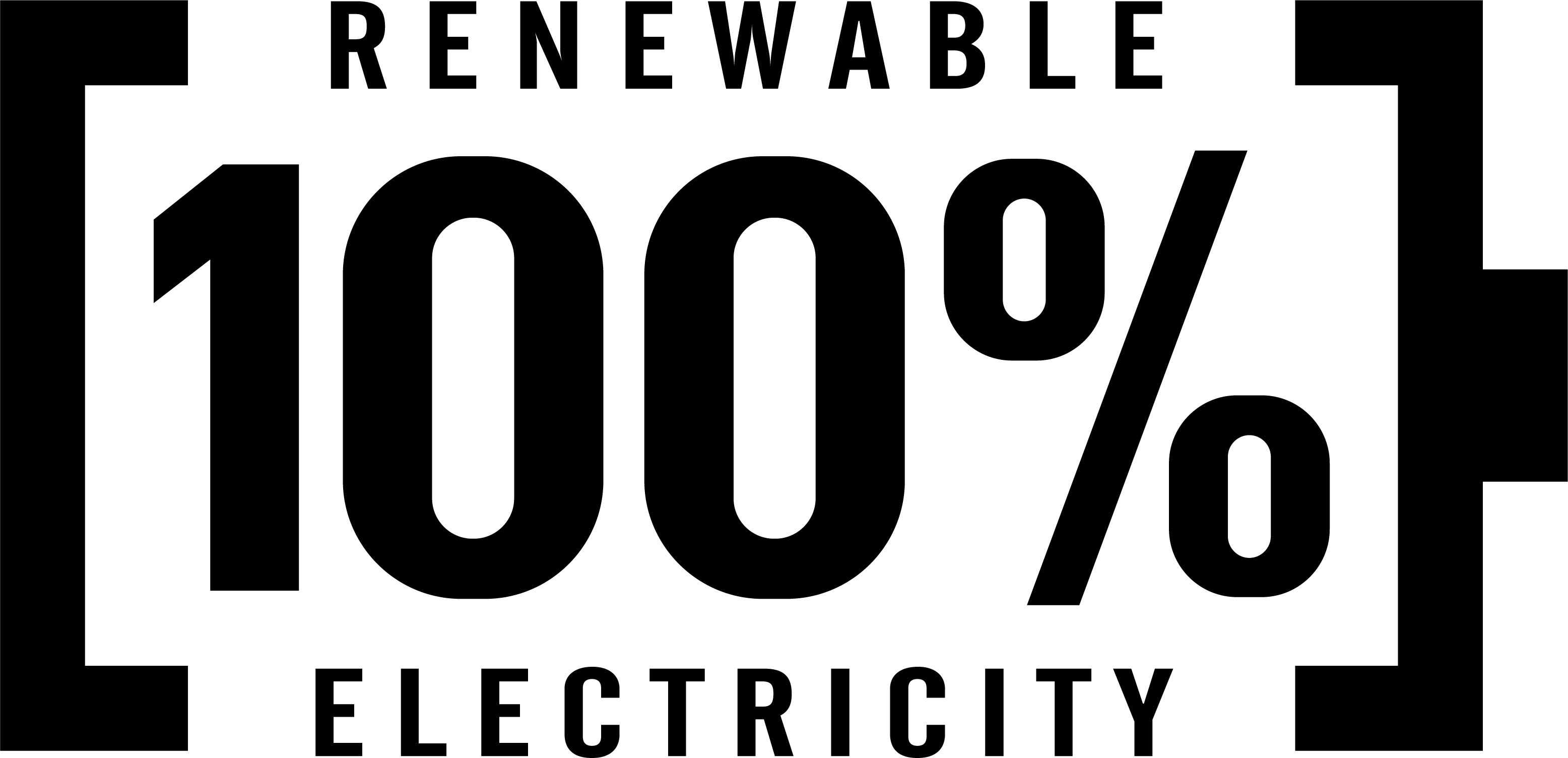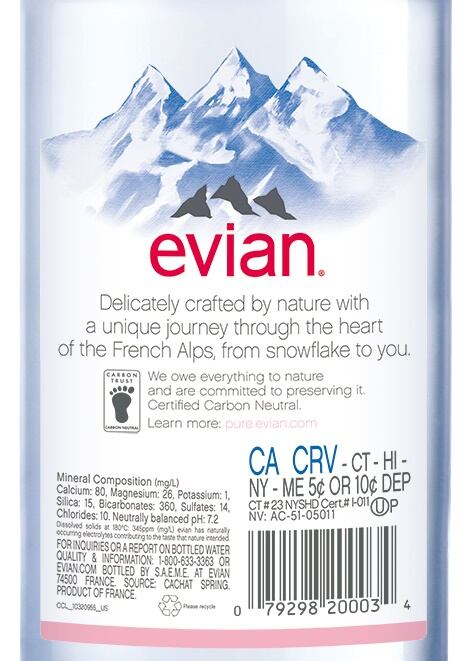Imagine beverages that must provide a list of packaging components with non-recyclable contents highlighted in bold; statements have to comply with the EU Register of Sustainability Claims, and consumers file lawsuits when big corporations make misleading sustainability statements.
Imagine a state where Prop 65 requires beverages containing certain chemicals to state: ‘Warning: this product is known to the State of California to cause litter or environmental toxicity’
And imagine a society where the government sets out a RDA – recommended disposable allowance – and each bottle states the percentage of your daily plastic usage.
What would the labels on your bottle look like?
This is not about CSR reports for investors: it’s about information for consumers
Let’s take a step back. I don’t believe that consumer interest in health, nutrition and well-being is going away anytime soon. I do believe, however, that consumer interest and scrutiny on how our actions affect the environment will increase: and each beverage brand will, sooner or later, find itself under the spotlight (with plastic bottles in the firing line, it may well be sooner).
Consumers already seek brands that meet their health and wellness goals: next will be brands that appeal to their sense of responsibility.
Sustainability claims will have increasing influence on purchasing decisions: and as part of that consumers will want to know which brands have the environment in mind (and boycott the ones that don't).
In the same way nutritional information for consumers has spread across all products (even alcohol); next will come a demand for information about the origins of packaging and what happens to it after it has been used.

This means that communication will have to turn from glossy CSR reports designed to appease eco-warriors and impress shareholders to clear, concise and readily available information for everyday consumers.
A number of brands do use various logos from certification bodies such as the Forest Stewardship Council, the Rainforest Alliance, Fairtrade etc – and the strength of these lies in the rigorous, independent certification.
Consumers do attach a certain amount of credibility to these: although people don’t always appreciate exactly what they signify – apart from the vague sensation that it’s something ‘good’.
There’s an opportunity for brands to step up with clear meaningful sustainability initiatives: and then present them to consumers on-pack to set them apart from the crowd.
There seem to be relatively few brands drawing out sustainability efforts as front-of-pack information: but a growing number are putting information on pack.
Nestle’s Pure Life brand will state ‘Made from 100% recycled plastic’ clearly on its front label, exactly where you might expect to see ‘low calorie’ or ‘made from natural ingredients’ called out on other brands.
Budweiser, meanwhile, is introducing a ‘100% renewable electricity’ symbol on its beers in the US, with plans to roll out to additional markets when appropriate.
PG tips’ new tea bags will state they are fully degradable on the box; and evian’s carbon neutral status in the US is marked on each bottle.

Nothing is ever simple
It has to be acknowledged that the importance of sustainability to consumers in their purchases is still relatively limited (a 2014 study observed that while consumers are generally concerned about the environment, this concern diminishes at the product level).
One imagines that the absence of prominent positioning for sustainability credentials indicates there is still a lack of consumers who make decisions on this basis.

But one only has to look at the rising interest in sustainability – take for example the reaction to the Blue Planet series in the UK – to wonder if this will create a shift change in how consumers make their decisions.
And consumer power shouldn’t be underestimated (UK retailer M&S recently withdrew its ‘cauliflower steak’ over complaints about its excessive plastic packaging and inflated price).
Another complication is that understanding and communicating sustainability is a minefield. Even a seemingly straight-forward question raises issues: Are plastic bottles an evil single-use packaging format that should never have been invented or a 100% recyclable light-weight liquid carrier that significantly reduces carbon emissions during transportation?
How many people understand the differences between recyclable plastic, recycled PET, bio-based plastics, plant-based plastics, biodegradable plastics, and so on? Will labelling these things mean anything to consumers, or will we end up with a host of nebulous green labels that look nice but mean nothing?
But health and nutrition has never been clear-cut either (Is fruit juice a wonderful source of vitamin C and a multitude of nutrients or is it packed full of sugar that will rot your teeth?) Just because being sustainable is difficult it doesn’t mean one should give up.
Brands such as PepsiCo and SodaStream are going for straight-forward, easily understandable solutions such as looking at ditching conventional packaging altogether: SodaStream with its at-home sparkling water machines and reusable bottles, and PepsiCo with its Drinkfinity reusable vessel and capsule system. Both are marketed strongly around the environmental benefits they believe they offer over conventional plastic bottles.
There may be few consumers who understand the ins and outs of polyhydroxyalkanoates and polyhydroxyarethanes, but surely anyone can look at a piece of shrink wrap and think: “That’s pretty wasteful”. (Someone at evian must have done just that because in 2016 the brand started offering a multipack where bottles are held together by adhesive, not shrink wrap).
And yes, there will inevitably be brands that present vague meaningless claims to ‘greenwash’ consumers. But with consumers becoming increasingly savvy, greenwashing just won’t…er…wash for very long.
Credibility will be key for any claims to work: so certification or backing from an independent body could be beneficial.
Far-fetched?
How far-fetched are the initial examples, really? The concept of food miles has been bouncing around for ages – it’s not a great leap of imagination to think that people will choose their bottled water on the basis of the closest source.
Faced with chronic drought, South Africa has limited the amount of water per person per day to 50 liters. Faced with a massive landfill problem, how different is the idea of limiting how much waste we each create every day?
But what’s great is that sustainability doesn’t have to be approached negatively as a chore or a complication. It’s actually a really positive way to set a brand apart from the rest.
As a consumer, I love the idea that my beer has been brewed by the sun. My geography is good enough to quickly identify a relatively local brand over one that is thousands of miles away. I’m keen to avoid that twinge of guilt when I throw shrink-wrap in the bin. I’d like my beverage purchase to give me a warm fuzzy glow that I’ve been a responsible citizen and bought from a responsible brand.
What do you think?
Leave your comment below or email rachel.arthur@wrbm.com
Consumers are willing to pay more for organic, they are willing to pay more for fair trade, and they are willing to pay more for eco-friendly cleaning products – so it makes sense they will be willing to pay more for a brand they consider to be environmentally sustainable.
So imagine that consumer who picks up your brand off the shelf and wants to consult a Sustainability Facts panel, or expects to see clear indication that your brand helps them become a responsible consumer. That’s the consumer of the future – and the one you should be addressing.
- With thanks to Professor Klaus Grunert, Aarhus University; and Jim Cornall, DairyReporter; for their feedback.
Rachel Arthur is the editor of BeverageDaily and has been writing on the site since 2014.
